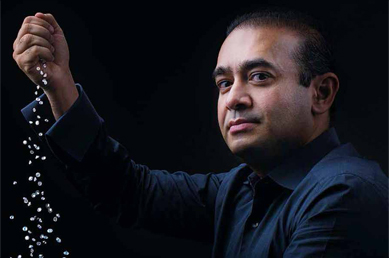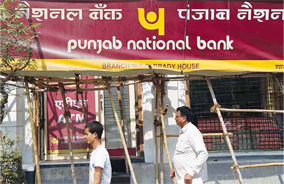Nirav Modi and his uncle Mehul Choksi proved the old adage that all that glitters is not gold and on the same lines proved that beneath the sparkling diamond it is only poisonous dirty carbon, while being cowards to run out of the country before public detected the crime
Unlike the regular tax desk which is manned by a tax officer whose job is to levy tax on you, this desk is manned by a non-serving tax officer who wishes to share his experience of 35 years in the tax department, while, discussing tax provisions. It is advantageous to know how the tax department thinks and acts when, as said by Benjamin Franklin, “In this world nothing is certain except death and taxes”

Our banking system was recently rocked by a daylight robbery. The Punjab National Bank branch in Fort area of Mumbai was plundered by an amount of about Rs.12,600 crore and on evaluation, it may go up to Rs.20,000 crore. The money stolen belonged to the citizens of this country who are honest taxpayers.
The perpetrators of the crime, Nirav Modi and Mehul Choksi are elite diamond merchants and jewellery designers, having presence in many parts of the world. The glitterati adored their creations, and many international models and stars were their regular clients. They literally proved the old adage that all that glitters is not gold, that beneath sparkling diamond it is only poisonous dirty carbon, and that they are cowards in the way they silently escaped out of the country before the public could detect the crime. It was a well-orchestrated loot in which some of the branches were found complacent.
Satish Shetty, who worked as the deputy manager in the branch along with his assistant, were tools in the conspiracy. The crime activity started in 2011 and continued till 2017 till Shetty retired. The culprits left the country in the first week of January 2018 along with their families, almost a month before the crime was brought to light. Today, all the enforcement agencies are actively working, and assets of about Rs.600 crore belonging to them including diamond stock and properties have been seized and attached. Criminal proceedings are in progress, but so far there is no knowledge of the whereabouts of these criminals. Their Indian passports have been cancelled, but it is believed that they also have passports of some other countries.
What is the nature of the crime? How was it committed? Satish Shetty of the Brady House branch of PNB was approached for letters of undertaking (LoU). LoUs were issued by Shetty without entering them in the core banking system. This meant that they were issued without any back-up records. LoUs were sent as messages on the international messaging system (SWIFT) by Shetty’s assistant without any corresponding entries. These LoUs were sent to Indian branches in foreign countries, mainly Hong Kong, where Nirav Modi has establishments. These foreign branches of Indian public sector banks were very quick to oblige and credits were extended by them to facilitate purchase in the international market by Nirav Modi and Mehul Choksi firms.

It is doubtful whether these foreign branches of Indian banks sent confirmations to PNB about the receipt of LoUs, which is the necessary requirement. There is also a possibility that Shetty and his team might have taken precautionary steps to bury such correspondence or messaging. Initially, credits taken against LoUs from foreign branches of Indian banks were cleared by taking new loans against new LoUs from the Brady House branch of PNB, but later they were allowed to pile up and the unpaid credit swelled to Rs.12,600 crores. Normally, the life span of an LoU is 180 days, but Shetty became brazenly close to his retirement and a life span of one year was given to the LoUs.
It is not understood why the foreign branches of Indian banks did not see red and report the matter to the higher-ups in PNB or the RBI. In a nutshell, the modus-operandi adapted was a naked fraud on the system, by making transactions without entry into the books. Both the auditor of the bank and the concurrent auditor missed unearthing the crime. The checks and balances of the RBI also failed. The crime went unnoticed as the higher authorities of the PNB kept Shetty in the same branch for seven years when the established practice is a tenure of three years.
The matter came to light when new officers refused to issue LoUs without adequate security, and it was discovered that LoUs were issued to the concerned parties in the past against banking norms, and in a fraudulent manner.
Was it a system failure of banking? Yes, it was, and it was not an isolated event. Our banking system and particularly our public sector banks have been regularly suffering from frauds. The greed of some unethical business houses supported by a section of our corrupt bank staff have been the cause of our huge Non Performing Assets (NPA) and huge losses to the banks. Roughly 10% of lending by our public sector banks which amount close to Rs.10 lakh crore have become bad debts or potential bad debts
After the Nirav Modi and Mehul Choksi scam we have unearthed wilful default by the Rotomac Group of Kanpur where the loss caused to the consortium of banks is more than Rs.3,000 crore. Now cases of such losses like loss caused to banks by a sugar mill and a Delhi jeweller have also surfaced.
‘The greed of some unethical business houses supported by a section of our corrupt bank staff have been the cause of our huge Non Performing Assets (NPA) and huge losses to the banks. Roughly 10% of lending by our public sector banks which amount close to Rs.10 lakh crore have become bad debts or potential bad debts

There are three major reasons for the systems failure. First, it is the lack of proper and objective evaluation of loan-seeking proposals and credibility of the parties involved. Secondly, it is the lack of a robust process for monitoring the movement of money advanced. Thirdly, it is the lack of adequate management control and lacklustre auditing by the auditors. The RBI too failed to come up with proper guidelines and checks despite being the ultimate watch dog for banks.
We keep on committing mistakes and do not learn from our experiences. Scams and losses keep on hitting headlines, but we fail to improve our system and do not learn from our past failures. There is only one thing more painful than learning from experience, and that is not learning from experience, as said by a wise man.
As this illustrates the ingredients of a system failure, I am reminded by a case I had come across over 30 years ago. I had conducted income tax raids against some leading elite and well-known companies in Mumbai to investigate insider trading in the capital market. I had to make enquiries against a top public sector bank which had advanced about Rs.7 crore to a well-known NRI from its London branch for his project in Nigeria.
The loan taken did not go to Nigeria, but through a sequence of funds transfer from one bank to another, reached Mumbai in just three days, to acquire a major stake in a well-reputed company where his personal friend was the managing director. The NRI was privy to information that the company was going to issue bonus shares and that the price of the shares would rise. The NRI made his money and later exited from the company. The lending bank in London remained unaware of the movement of money lent by it and that it went to the share market, whereas as per RBI norms, money cannot be lent for playing in the share market.
The same thing happened during the Harshad Mehta scam, when money from banks were being diverted to the share market and banks remained unaware till the scam broke.
Barring some genuine cases of business failure frauds, losses to the banks can be prevented if we follow the forensic trail of money lent, as in case of frauds, money lent goes into areas other than the professed destination. Many unethical loan takers divert the money for their self-use rather than for nurturing the businesses for which it was lent. Loan-giving banks are also seen to give loans to shell companies in many cases, where the real identity of unethical business persons is kept hidden. These shell companies only work as transfer agents of the funds coming from banks. Money so lent evaporates in no time, and banks have nothing left but bad loans.
In this connection, I am reminded of a case of a listed company whose promoters had started about 30 shell companies in the names of its staff only for the limited purpose of taking loans from a PNB. For taking loans, bogus turnover was created in the books of the shell companies and the officials of the bank were lured by corrupt practices and honey trapping. The loans so given were NPAs from day one, as I discovered through the search action.
‘There are three major reasons for the systems failure. First, it is the lack of proper and objective evaluation of loan-seeking proposals and credibility of the parties involved. Secondly, it is the lack of a robust process for monitoring the movement of money advanced. Thirdly, it is the lack of adequate management control and lacklustre auditing by the auditors’
The recent scam of Nirav Modi and his uncle Mehul Choksi has all the characteristics of a total system failure, coupled with a deadly fraud. The Brady House branch of PNB was hit by fraud by entering into LoUs without guarantees, and the senior officers failed to supervise what their juniors were doing, over seven years. The auditors failed to reconcile the income generated by the guarantee letters given and the actual transaction. They failed in their audit.
The foreign branches of Indian banks failed completely in following the norms. Credit against alleged purchase of diamonds was given without following the actual movement of money and the diversion of such funds for personal use by the scamsters. Loan was given by the banks without verifying the loanees’ ability to pay, while they blindly guarded themselves with fraudulent LoUs of one-year periods when they knew that LoUs cannot be issued for more than 180 days. Apparently, they never verified the genuineness of the LoUs, as they did not care about public money.
Again, there was a total failure of governance and audit in these banks. As against public sector banks, private banks are better placed as they are owners with financial interest in the banks they administer
‘The Cabinet has cleared a Bill, the Fugitive Economic Offence Bill, which empowers the government to confiscate the properties of the offenders with retrospective effect. Such offenders will not be entitled to any civil rights to protect their confiscated assets. The government will also have the power to proceed against the properties and assets located outside India’

Meanwhile, after the detection of the Nirav Modi scam, the government has started taking some reformative measures. The Cabinet has cleared a Bill, the Fugitive Economic Offence Bill, which empowers the government to confiscate the properties of the offenders with retrospective effect. Offenders include people committing economic offences of more than Rs.100 crore, and running away from the country. Such offenders will not be entitled to any civil rights to protect their confiscated assets. The government will also have the power to proceed against the properties and assets located outside India, and for that, some cooperation from foreign governments will help seize the benami properties of the offenders. The offender will get leniency and the proceedings will stop if he comes back to India and joins the investigation before the proceedings are complete. This Bill is likely to become law as early as in April 2018.
The government has also decided to strengthen the auditing system in the country by establishing the National Financial Regulation Authority (NAFRA). This Authority will have the authority to regulate the audit system of listed companies. NAFRA can initiate punitive action against errant auditors. This way there will be some dilution of the power of the Institute of Chartered Accountants of India (ICAI). The establishment of NAFRA will be in conformity with the provision of the Companies Act, 2013.
The decisions taken by the government are in the right direction, but more reformative measures need to be taken. The government should think of privatising public sector banks, as most of them run into losses because of NPAs. There is no justification for putting honest tax payer money into loss making banks by recapitalisation.
Meanwhile, until the banks are privatised there can be a consolidation of existing public sector banks by mergers. Here there should also be consolidation of offshore branches of these banks. There should be serious punitive action of the senior executives of the banks if they are found wanting in the lack of governance and administration. There should be detailed guidelines on giving loans by banks, and the infringement of these guidelines should be viewed seriously. The government has directed banks to analyse each case of NPA exceeding Rs.50 crore and to refer the case to the CBI in case there is any fraud. The government should make a fortnightly review of its directions and the guilty banks should be punished for non-compliance.
However, care has to be taken to see that the ease of doing business does not suffer. Those following unethical bank practices should be punished, but at the same time loans have to be lent, otherwise there will be no economic growth. A prudent balance between giving loans and harsh measures has to be maintained. All measures should be transparent, and there should be no fear in the minds of people taking loans for doing ethical businesses after following the due process of regulation. People in business should follow the words of Henry Ford that a business that makes nothing but money is a poor kind of business. We should earn money without greed and with a clean heart and not by fraudulent practices. If this happens, there will be no need for any harsh measures by the government.
by S K Jha